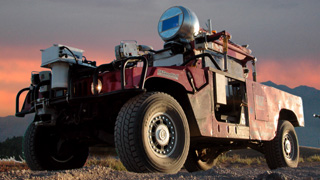 Horizon was always great because it was never afraid to throw you in at the deep end before teaching you how to swim. There was a kind of inconsiderate edge to it, a challenge to the viewer. Its slogan was 'Pure science, sheer drama'. With this new series, the difficulties have gone. Much like almost any other show on TV, I could let my brain idle along without having to worry about what I had just seen, explained concepts or abstract terminology.
Horizon was always great because it was never afraid to throw you in at the deep end before teaching you how to swim. There was a kind of inconsiderate edge to it, a challenge to the viewer. Its slogan was 'Pure science, sheer drama'. With this new series, the difficulties have gone. Much like almost any other show on TV, I could let my brain idle along without having to worry about what I had just seen, explained concepts or abstract terminology.Take the show from two weeks ago which was all about cars that could drive themselves across 130 miles of rough desert terrain. How many producers are wishing right now that they'd pitched that as a programme synopsis?
Bill Nighy gave the kind of voiceover Ian McShane dreams about, his pronunciation of 'DARPA' a particular highlight. It was like listening to a camp version of the Emperor from Star Wars. The usual variety of geeks included a righteous Napoleon Dynamite character who reckoned his self-righting motorbike was, like, the coolest thing ever. My favourite was Sebastian Thrun, who look as if he was germinated in some weird scandinavian greenhouse. Shortly after winning the race with the classy 'Stanley' off-roader, he declared that 'everyone's a winner', something I doubt he would be saying had he lost.
Speaking of losers, his nemesis William 'Red' Whittaker was nothing if not thorough, pitching two robots into the battle, 'Highlander' and 'Sandstorm'. Doesn't bode well for the family tree. Apart from committing the ultimate nerd faux pas of quoting the A-Team ('I love it when a plan comes together') this ex-marine seemed like the kind of ballbreaker that really gets the job done. Which made it all the sweeter when he lost to Moby lookalike of the year 2006, Sebastian.
There were numerous highlights, most of them provided by the robot motorbike 'Ghostrider'. It really was so much fun watching the sheer desperation on Napoleon Dynamite's face as the bike careered, collided, skidded and slid its way through a variety of increasingly hostile situations. The best moment was a replay of the previous year's challenge, when the very same guy had forgotten to turn on the bike's stabiliser. Five feet from the starting line it wobbled, before crashing and burning in a quite spectacular fashion considering it was doing around 3mph. The show was so entertaining it left barely enough room for the science.
In fact, the closest it got to hard science involved some elaborate CGI overlays of what the car was 'seeing'.
It's disappointing. It's not a one off either. The week before, it referred to some 'singularity', a kind of uber-bollocks delineation of an all-powerful computer mind. Never heard that one before. Danny I'm-beating-Dave-Gorman-at-his-own-game Wallace, the first on-screen presenter in Horizon's 40-year history, was entertaining but again lacking in substance.
I think the new look of the show is superbly executed, the accompanying website is informative a wide-reaching, and the more recognisable voices and personalities are welcome. I just wish it had a bit more of the geek still left in it. Talking heads are the ace in Horizon's pack, the points at which hard science can be explained by real people with comprehensible analogies. In this series, all we've learnt is that Danny Wallace was struggling with ethics and some guy was disappointed that his robot bike fell over. Why did it fall over? What was it that made the self-righting mechanism fail? Was it to do with the tunnel? Did the sensors break? What were the ultimate advantages held by Thrun's team over Whittaker's? None of these questions was satisfactorily answered, and they would have been in past editions. Instead we got empty reaction shots like 'everyone's a winner' and Napoleon Dynamite's 'I hope they don't do it for a third year because I don't want to go through all this again'.
I'm not advocating a return to the old-fashioned style of previous editions. What I want is a return to the old-style content delivery. There were moments in the last series when I was left scratching my head, wondering what to make of it all, where to go to understand more. So far, with this series, I haven't had a single question left unanswered. Surely this is the audience Horizon should be aiming for, the pro-active viewer who goes out and learns more about what are undoubtedly fascinating subjects. Without Horizon I wouldn't have been introduced to the brilliance of Michio Kaku, weird multiple universes, the awe-inspiring concepts of supervolcanoes, or the ultimate paradox of time travel. Horizon is called Horizon because it's a programme in which the layman can understand the cutting edge of science, given access into the scientific world minus the dullness of algebra, explained in an interesting and often dramatic way. You can take away the science and still make it entertaining, but do we really want the flagship science show on television to go all Scrapheap Challenge on us? It might be fun for now, but it will soon tire.
No comments:
Post a Comment